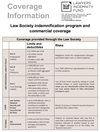|

|
You and your firm may be at risk of having claims that are not covered by the compulsory professional liability indemnification policy. Commercial insurance companies have developed insurance policies to protect you and your firm for different risks which continue to evolve to respond to new risks in doing business. There are different insurance options available and the terms of cover, including deductible amounts, may vary between insurers and brokers. Additional information is in the chart to the left, and below are brief descriptions of commercially available insurance products commonly sought by law firms. Talk to one or more brokers selling commercial insurance for law firms to learn what is best for you and your firm.
|